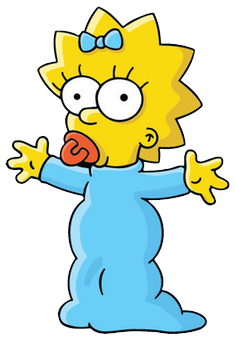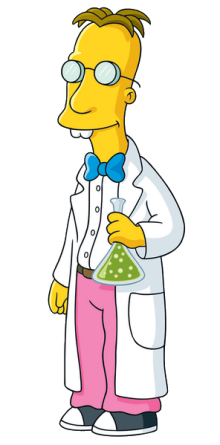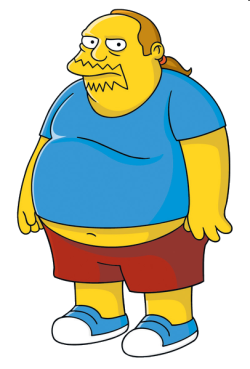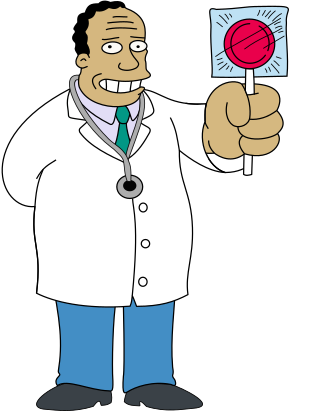
Margaret Lenny "Maggie" Simpson is a fictional character in the animated television series The Simpsons and the youngest member of the Simpson family. She first appeared on television in the Tracey Ullman Show short "Good Night" on April 19, 1987. Maggie was created and designed by cartoonist Matt Groening while he was waiting in the lobby of James L. Brooks' office. She received her first name from Groening's youngest sister. After appearing on The Tracey Ullman Show for three years, the Simpson family was given their own series on the Fox Broadcasting Company which debuted December 17, 1989.

Lisa Marie Simpson is a fictional character in the animated television sitcom series The Simpsons. She is the middle child of the Simpson family. Voiced by Yeardley Smith, Lisa was born as a character in The Tracey Ullman Show short "Good Night" on April 19, 1987. Cartoonist Matt Groening created and designed her while waiting to meet James L. Brooks. Groening had been invited to pitch a series of shorts based on his comic Life in Hell, but instead decided to create a new set of characters. He named the older Simpson daughter after his younger sister Lisa Groening Bartlett. After appearing on The Tracey Ullman Show for three years, the Simpson family were moved to their own series on Fox, which debuted on December 17, 1989.

Professor John I.Q. Nerdelbaum Frink Jr. is a recurring character in the animated television series The Simpsons. He is voiced by Hank Azaria, and first appeared in the 1991 episode "Old Money". Frink is Springfield's nerdy scientist and professor and is extremely intelligent, though somewhat mad and socially inept. Frink often tries to use his bizarre inventions to aid the town in its crises but they usually only make things worse. His manner of speech, including the impulsive shouting of nonsensical words, has become his trademark.

Moammar "Moe" Szyslak is a recurring character from the animated television series The Simpsons. He is voiced by Hank Azaria and first appeared in the series premiere episode "Simpsons Roasting on an Open Fire". Moe is the proprietor and bartender of Moe's Tavern, a Springfield bar frequented by Homer Simpson, Barney Gumble, Lenny Leonard, Carl Carlson, Sam, Larry, and others.

Jeff Albertson, commonly known as the Comic Book Guy (CBG), is a recurring fictional character in the animated television series The Simpsons and Eisner-nominated spin-off comic book series Comic Book Guy. He is voiced by Hank Azaria and first appeared in the second-season episode "Three Men and a Comic Book", which originally aired on May 9, 1991. Comic Book Guy is the proprietor of a comic book store, The Android's Dungeon & Baseball Card Shop. He is based on "every comic book store guy in America" and represents a stereotypical middle-aged comic-book collector with a supercilious attitude and obsessive knowledge of pop culture minutia. He is known for his distinctive accent, disagreeable personality, and his catchphrase, "Worst [thing] ever!"
Apu Nahasapeemapetilon is a recurring character in the American animated television series The Simpsons. He is an Indian immigrant proprietor who runs the Kwik-E-Mart, a popular convenience store in Springfield, and is known for his catchphrase, "Thank you, come again". He was voiced by Hank Azaria and first appeared in the episode "The Telltale Head". He was named in honor of the title character of The Apu Trilogy by Satyajit Ray.

Dr. Julius M. Hibbert, M.D. is a recurring character on the television animated sitcom The Simpsons. He is Springfield's most prominent medical professional. Although he has a kind and warm persona, he is also often characterized as greedy and lacking in empathy. His signature character trait is his often-inappropriate chuckling, which is generally cued by misfortune rather than something genuinely amusing. The character debuted on December 6, 1990, in the episode Bart the Daredevil. He was voiced from his debut by Simpsons regular Harry Shearer, and since a recasting of all of the show's non-white characters, by Kevin Michael Richardson from 2021.

Chief Clancy Wiggum is a fictional character from the animated television series The Simpsons, voiced by Hank Azaria. He is the chief of police in the show's setting of Springfield, and is the father of Ralph Wiggum and the husband of Sarah Wiggum.

Santa's Little Helper is a fictional dog in the American animated television series The Simpsons. He is the pet greyhound of the Simpson family. He was previously voiced by Frank Welker, and is currently voiced by Dan Castellaneta. The dog was introduced in the first episode of the show, the 1989 Christmas special "Simpsons Roasting on an Open Fire", in which his owner abandons him for finishing last in a greyhound race. Homer Simpson and his son Bart, who are at the race track in hope of winning some money for Christmas presents, see this and decide to adopt the dog.

Henry Albert "Hank" Azaria is an American actor. He is known for voicing many characters in the long-running animated sitcom The Simpsons since 1989, including Moe Szyslak, Chief Wiggum, Superintendent Chalmers, Comic Book Guy, Snake Jailbird, Professor Frink, Kirk Van Houten, Duffman, Apu Nahasapeemapetilon, Lou, Carl Carlson, among others. Azaria joined the show with little voice acting experience, but became a regular in its second season. For his work on the show, he has won four Primetime Emmy Awards.
"Moaning Lisa" is the sixth episode of the American animated television series The Simpsons. It originally aired on Fox in the United States on February 11, 1990. The episode was written by Al Jean and Mike Reiss, and was directed by Wes Archer. Ron Taylor guest stars in the episode as Oscar "Bleeding Gums" Murphy. The episode deals with Lisa's depression and her attempts to sublimate it by playing her saxophone.

The Itchy & Scratchy Show is a fictional animated series featured on The Simpsons. The cartoon depicts a sadistic mouse named Itchy who repeatedly maims or murders a black cat named Scratchy. It is typically presented as 15- to 60-second sketches that are a part of The Krusty the Clown Show. Itchy & Scratchy is filled with graphic violence, unsuitable for children, that almost invariably prompts laughter from The Simpsons characters, especially Bart and Lisa.

"Homer's Enemy" is the twenty-third episode of the eighth season of the American animated television series The Simpsons. It was first broadcast on the Fox network in the United States on May 4, 1997. "Homer's Enemy" was directed by Jim Reardon and written by John Swartzwelder, based on an idea pitched by executive producer Bill Oakley.

The Simpson family are the main fictional characters featured in the animated television series The Simpsons. The Simpsons are a nuclear family consisting of married couple Homer and Marge and their three children, Bart, Lisa, and Maggie. They live at 742 Evergreen Terrace in the fictional town of Springfield, United States, and they were created by cartoonist Matt Groening, who conceived the characters after his own family members, substituting "Bart" for his own name. The family debuted on Fox on April 19, 1987, in The Tracey Ullman Show short "Good Night" and were later spun off into their own series, which debuted on Fox in the U.S. on December 17, 1989, and started airing in Winter 1990.
"Bart Gets Hit by a Car" is the tenth episode of the second season of the American animated television series The Simpsons. It originally aired on Fox in the United States on January 10, 1991. In the episode, Bart is hit by Mr. Burns' car. Prompted by ambulance-chasing lawyer Lionel Hutz and quack doctor Nick Riviera, the Simpsons sue Burns, seeking extensive damages for Bart's injuries. Hutz and Dr. Nick exaggerate Bart's injuries to earn the jury's sympathy at the trial. Marge wants Homer to accept Burns' proposed settlement instead of asking Bart to lie on the witness stand.
"Lisa's Substitute" is the nineteenth episode of the second season of the American animated television series The Simpsons. It originally aired on Fox in the United States on April 25, 1991. In the episode, Lisa's teacher Miss Hoover takes medical leave due to what she thinks is Lyme disease. Lisa finds the teaching methods of the substitute teacher, Mr. Bergstrom, inspiring and discovers an entirely new love for learning. When Miss Hoover returns to class, Lisa is devastated to lose her most positive adult role model. Eventually, she realizes that while Mr. Bergstrom was one of a kind, she can find role models in other people, including her father Homer. Meanwhile, Bart runs for class president against Martin.

"Moe Baby Blues" is the twenty-second and final episode of the fourteenth season of the American television series The Simpsons. It originally aired on the Fox network in the United States on May 18, 2003. Moe, unhappy and suicidal, inadvertently saves Maggie's life. The two of them grow to love each other.
"Summer of 4 Ft. 2" is the twenty-fifth and final episode of the seventh season of the American animated television series, The Simpsons. It originally aired on the Fox network in the United States on May 19, 1996. In the episode, the Simpson family stay in Ned Flanders' beach house. Hanging around with a new set of children, Lisa becomes popular, while Bart is left out. Bart tries to sabotage his sister's newfound acceptance, but fails.
"Three Men and a Comic Book" is the twenty-first and penultimate episode of the second season of the American animated television series The Simpsons. It originally aired on Fox in the United States on May 9, 1991. In the episode, Bart finds the rare first issue of Radioactive Man for sale at a comic book convention. Unable to afford it, he convinces Martin and Milhouse to pool their money to buy the valuable comic, only to see it destroyed by their selfishness and inability to share. This episode contains the first appearance of the Android's Dungeon and its owner, Comic Book Guy, voiced by Hank Azaria.













